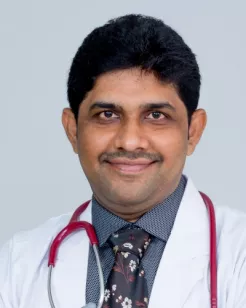At Aster Ramesh Hospitals all the necessary factors of weight-loss surgery are considered to help you decide if it is right for you. We examine every benefit and risks associated with every individual patient. Usually, the risks of bariatric surgery are minimal when compared to the risks of living with obesity that carries risks of various severe conditions like complications related to diabetes, sleep apnoea, and hypertension.
It is always better to discuss all your concerns with the expert bariatric team before making any decision. You just have to take the first step towards a healthier life, and we will make every effort that takes you to a healthy life. Bariatric surgery is just one milestone in the path of your weight loss journey. Pre-operative counselling, surveillance during the weight-loss period and a lifetime of ongoing support and education from the Bariatric team are essential to make the most of your life as you continue to manage your weight loss. We provide a holistic approach to care. Physical therapists, sleep medicine experts, psychologists, a bariatric coordinator and a variety of specialists appropriately address the specific needs of bariatric patients.




